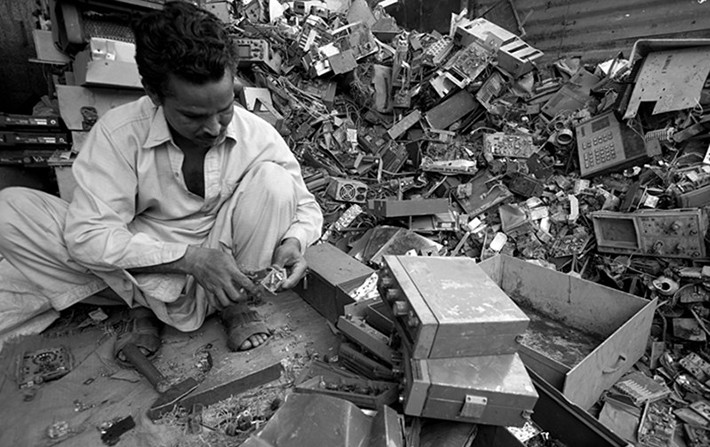
The city has no mechanism of properly dumping its e-waste while the people are unaware of the health hazards they pose

Searching for a colourful toy for their children from a roadside heap of broken electronic gadgets is a good Sunday pastime for many parents in different neighbourhoods of the city these days.
These parents don’t know they are actually buying poison for their children in the shape of broken/used/outdated electronic toys or gadgets as these items contained highly toxic heavy metals like lead, arsenic, barium, cadmium, mercury etc. which may cause serious health issues.
A recent report of the Basel Action Network (BAN) which works to combat the export of toxic waste claims that 50 to 80 percent of e-waste generated in the West including the US is exported to many developing countries including Pakistan, India, China, Taiwan and a number of African countries.
It is an open secret that developed countries ‘dump’ their e-waste to developing countries because formal recycling of this waste is very expensive whereas in developing countries cheap labour and informal recycling methods are easily available.
The provincial metropolis is fast becoming a dumping ground for electronic waste of many western countries and one can find shops selling broken/used electronics in almost every neighbourhood.
Big scrap dealers who are importing e-waste in Pakistan are operating in Mint, Misri Shah, Dharampura, Shalimar, GT Road, Anarkali (Mayo Hospital side), Township, Sanda and Rajgarh areas.
"My son loves to play with plastic guns. I can’t purchase brand new costly gadgets so I went to Anarkali Bazar and got a used toy for my kid," says Shakeel Ahmed. He says it just cost him Rs100 whereas the new toy was around Rs2500. He didn’t know this toy contained any hazardous material which might harm his son’s health.
Environment experts claim the electronic gadgets have hidden dangers once they become e-waste. They say that toxic elements in electronic gadgets pose a real danger if these gadgets are not disposed of properly.
They also reveal that heavy metals such as lead, barium and cadmium can be really harmful for health if they enter the water system. These materials can cause damage to the human nervous and respiratory systems. Environmentalists add that flame-retardant plastics, used in electronics casings, release particles that can damage human endocrine functions.
The landfill site in Lahore is the only scientific landfill site in the country and that also doesn’t have any solution to e-waste. "We receive mix waste at the landfill and we dump it as it is," says Jamil Khawar, spokesperson Lahore Waste Management Company (LWMC). He confirms the scientific landfill site didn’t have any special section to deal with this kind of waste.
According to the Basel Action Network, more than 500,000 used computers are still sent to Pakistan each year from developed countries including Singapore, USA, and a few European nations, despite the fact that it is in clear violation of international laws. Only an estimated 15 to 40 percent of the computers are in usable condition, while the rest are recycled in extremely hazardous conditions.
Environmentalists say that once these toxic materials are dumped at a landfill site, they start seeping out into the environment, contaminating land, water and air.
Outside the city, there is no law or regulation to stop the import of e-waste into the province as there is no law or SOP for recycling of this waste.
Naseemur Rehman, focal person of Punjab Environment Protection Department (EPD), agrees that "so far there is no such law". He informs that a national strategy is needed to tackle the issue of e-waste, admitting that "e-waste volume in Lahore is rapidly increasing and there is an immediate need to make the consumers aware of the dangers of this waste".
He says, "The department has taken action against many factories, burning of batteries and plastic for reuse. The department is brainstorming over the issue and a draft policy will be prepared soon."